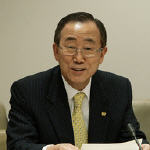
The security and humanitarian situation in the far east of the Democratic Republic of the Congo (DRC) continues to crumble, despite the recent signing of a peace pact between the Government and a key militia, Secretary-General Ban Ki-moon writes in a new report.
On 23 March, the Government and the National Congress for People’s Defence (CNDP), one of the main combatants in the fighting, signed a peace accord.
But the report made public today, which covers the period since the end of March, points to new challenges, “which further increase the fragility and volatility of the situation” in the area.
The obstacles include the capacity and conduct of the newly-integrated units of the DRC forces, known as FARDC, in North and South Kivu provinces, it said, with many troops being unpaid, poorly trained and badly equipped.
Command and control of FARDC units is also fragile, resulting in stepped up desertions, mutinies and “a surge in unacceptable abuses against the very populations that these forces are expected to protect,” Mr. Ban wrote.
There are some 1.7 million internally displaced persons (IDPs) in eastern DRC, with 500,000 having been uprooted since this January due to clashes between the FARDC and the rebel Democratic Liberation Forces of Rwanda (FDLR).
But he pointed out that 350,000 displaced have been able to return to their homes in North Kivu.
Notwithstanding this positive development, the Secretary-General said that the human rights situation is still cause for grave concern.
Members of the FARDC and the Congolese National Police are responsible for rape and torture, among other abuses, while members of foreign armed groups such as the FDLR and the notorious Ugandan group known as the Lord’s Resistance Army (LRA) are responsible for massacres of civilians, sexual violence and arbitrary executions.
Another major obstacle continues to be addressing impunity, requiring the efforts of the highest levels of Government to bring those behind human rights and other abuses to justice, the report said.
To this end, the UN peacekeeping mission in the DRC, known as MONUC, is creating an action plan to ensure that the Government agrees on a strategy to combat sexual violence.
Also made public today was a report by the Security Council mission which visited the African Union (AU) at its headquarters in Addis Ababa, Ethiopia, Rwanda, the DRC and Liberia from 14-21 April.
The Council called on the Governments in the region, especially the DRC and Rwanda, “to continue to build on the positive momentum created by their recent improved relations and to continue to take measures aimed at building confidence between them and laying the foundations for sustainable regional cooperation.”
The body also welcomed the appointment of a Rwandan ambassador to the DRC, urging the DRC in turn to expedite its appointment of an ambassador to Rwanda.
On sexual and gender-based violence, the Government must take decisive action to address confirmed abuses by FARDC soldiers, the report said, including following on the list of five officers in commanding positions assessed to have carried out such crimes.
Related articles
- • DRC and Rwanda Sign Declaration of Principles for Peace in Eastern Congo (April 25, 2025)
- • UK Suspends Financial Aid to Rwanda Over M23 Rebellion (February 25, 2025)
- • Tshisekedi Announces Government of National Unity and Calls for Unity Against M23 Rebels (February 23, 2025)
- • UN Security Council Calls on Rwanda to Stop Supporting M23 Rebels in DR Congo (February 22, 2025)
- • Rwanda-Backed M23 Rebels Summarily Executed Children in Bukavu, UN Reports (February 19, 2025)
- • DR Congo Citizens Head to Polls to Elect President, Members of Parliament (December 20, 2023)
- • 'Deadly environment' plus 'political and social' obstacles hinder Ebola fight, Security Council hears (July 24, 2019)
- • Ebola outbreak declared an international Public Health Emergency (July 17, 2019)
- • Jean-Pierre Bemba Returns to DR Congo (August 1, 2018)
- • At least 30 dead after massacres in Ituri (March 2, 2018)
- • Botswana Urges Joseph Kabila to Step Down (February 26, 2018)
- • No elections in DR Congo in December without electronic voting machines: INEC (February 13, 2018)
- • DR Congo reach final of African Nations Championship (February 3, 2016)
- • Peacekeepers, Congo Army to Resume Joint Fight Against Rwandan Rebels (January 28, 2016)
- • Political tensions 'running high' in DR Congo ahead of 2016 elections (October 7, 2015)
- • UN Report Blames Ugandan Islamists for 237 Killings in DR Congo (May 14, 2015)
- • DRC Army Putting Pressure on FDLR (April 1, 2015)
- • Police Open Fire on Crowd Protesting Election Law Change (January 19, 2015)
- • Southern African Leaders to Meet in Zimbabwe (August 15, 2014)
- • Senior UN officials urge Brazzaville to halt expulsion of DR Congo nationals (May 26, 2014)
- • 15 dead in football match stampede in Kinshasa (May 12, 2014)
- • Kerry Calls on Kabila to Honor Constitution (May 4, 2014)
- • Security Council extends UN mission, intervention force in DR Congo for one year (March 28, 2014)
- • U.S. sending more personnel to Uganda to hunt LRA leader Joseph Kony (March 24, 2014)
- • Death toll in Lake Albert boat accident rises to 108 people (March 24, 2014)
- • Bosco Ntaganda Attacked Civilians on Ethnic Grounds, ICC Prosecutor Says (February 10, 2014)
- • New DR Congo amnesty law welcomed by UN envoys (February 5, 2014)
- • Colonel Mamadou Ndala Is Killed in Ambush (January 2, 2014)
- • No 'Peace Deal' With Defeated M23 Rebels, DR Congo Says (November 11, 2013)
- • Congo Will Not Sign a 'Peace Deal' With Defeated M23 Rebels, Government Says (November 6, 2013)







